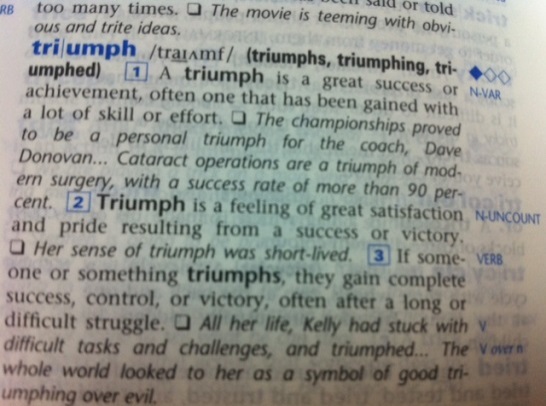 A common comment from new students at Langports is that they want to improve their vocabulary.
A common comment from new students at Langports is that they want to improve their vocabulary.
Have a read of my blog and pick up a few tips.
In this blog I will talk about the importance of learning different word families, and words as part of a phrase or a ‘chunk’. I will also show that a dictionary of over 1000 pages is not at all scary.
 Having a VOCABULARY NOTEBOOK is a great way to remember new words; you can refer back to words from previous lessons and often the words are taught in themes so you have a group of new words under the same topic.
Having a VOCABULARY NOTEBOOK is a great way to remember new words; you can refer back to words from previous lessons and often the words are taught in themes so you have a group of new words under the same topic.
A lot of students find it useful to translate new English vocabulary into their own language. If your vocabulary notebook looks like this, good effort, but there is soooooooo much more you can add, which will help you not only to LEARN vocabulary, but to REMEMBER it and more importantly to USE it.
Some teachers feel very strongly about their students NOT using a dictionary to translate words. Often, we can figure out the word by the context, but other times we are completely lost. It is these times when it is OK to use your dictionary, but it is important to remember that some words in English have MULTIPLE MEANINGS, so make sure you find the right one.
No matter what your first language is, there will always be errors that come from the lexical differences between the languages.
Take Japanese for example, in Japanese there is a phrase ‘gambaru (gambare/gambatte)’ this can be translated into lots of different phrases all meaning ‘don’t give up’

a. Tough it out
b. Hang in there
c. Stay strong
d. Do your best
e. Overcome your obstacles
f. Good luck
On a football field when their team is losing, and fans want to show support, they will yell ‘gambaru’, but translate this into English and not all the meanings listed above fit into this context. We would not tell our favourite footy team to do their best! This is weak! We want them to kick some butt!
In German, the word ‘gemutlich’ is used to describe an atmosphere which makes you feel relaxed and comfortable.
This can be loosely translated into English to mean
- Warm
- Pleasant
- Cozy
- Hospitable
But in actual fact there is no direct translation as none of the adjectives mentioned talk about the mood or atmosphere. A warm restaurant talks about temperature not mood, so the meaning is lost in translation.
So when learning a new word, there are a few things which are vital for memorizing it.
- What kind of word is it? Noun, adjective, verb…
- How common is it? Is it used everyday and by whom?
- How do I use it? If it is a verb, does it need an object? If it is an adjective, can it go before a noun, after a verb, or both?
- Of course, what does it mean? Does it have multiple meanings?
- How is it pronounced? Is the pronunciation different for the different word families?
I understand that an English dictionary can look a little frightening, but really an Advanced Learners Dictionary is actually quite easy to use, and REALLY helpful for your learning!
Let’s put this to the test.
Below is an article from today’s news about Brazilian surfer Adriano De Souza winning the Rip Curl Pro at Bells beach yesterday. Have a look at the highlighted words and see if you can figure them out by context, and if not, look them up.
ADRIANO De Souza Triumphs at Bells
Adriano De Souza, who won the Rip Curl Pro at Bells Beach, Victoria, yesterday, refused to be knocked off his board. The thing that seemed to keep him stuck to his board was pure patriotism.
De Souza kissed the Brazilian flag and growled at the sky. He was one seriously happy winner. It was his fourth professional win. The result boosts him from 24th to fourth in the world title rankings.
“I cannot describe how I feel right now,” he told MC and Rip Curl marketing boss Neil Ridgway. “I’m really proud of myself.”
De Souza rang the Bell trophy so hard that the bell broke from its frame and rolled across the floor of the podium.
De Souza carved his name all over the end section on the final day, landing a series of high-speed weightless moves. It really did look like there was something magic in his wax.
- triumphs
Adriano De Souza triumphs at Bells
Adriano De Souza is a name (proper noun) and is the subject in the sentence.
at Bells is a preposition phrase — take it out, we don’t need it.
triumphs is the verb in the sentence and because we can take away at Bells there is nothing that follows the verb. No direct object so the verb is intransitive. Base verb is triumph.
So triumph is the verb in this sentence, but triumph is also used as a noun. In your language is the same word used to describe triumph as a verb and a noun?

So this is what you will find in the dictionary.
Now you can see the meaning and the uses.
See the three diamonds? This shows the frequency of the word. The full diamonds means the word is in the top 1000 words used in English (these ones are important). The word triumph is in the top 3000, so still has a high frequency.
The entry in your vocab notebook could look like this…
triumph /ˈtraɪ əmf/
VERB definition; to gain success or victory
[V] (intransitive) It was a close match, but Manchester United triumphed.
V over n Manchester United triumphed over Liverpool
Noun definition; great success or achievement
N His triumph will go down in history
Word families
triumph (v) triumph n triumphant adj triumphantly adv
Collocation (use a collocation dictionary to really improve your vocabulary range.)
Adjectives used with triumph: remarkable, major, ultimate, latest, personal triumph
Verbs: score a triumph, see something as a triumph
Phrase: a moment of triumph, a sense of triumph
Now this looks like a lot of work, but by noting the definition, the frequency, the word families, and the uses with useful examples that are meaningful to you. You will have more chance remembering the word.
Have a try yourself
Here are the other words…
refuse
patriotism
boost
describe
weightless
- What kind of word is it?
- How common is it?
- How do I use it?
- What does it mean?
- How is it pronounced?
Then most importantly write an example which means something to you. You will be much more likely to remember a word if it is part of a sentence or phrase which is meaningful!
Happy vocab learning!!
(blog written by Joanna Hewson-Williams)